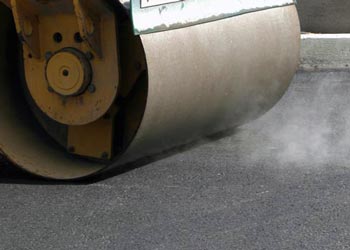
Did you know that is less expensive than new asphalt and is just as durable? Our Southeast MI asphalt paving contractors get a lot of questions about how the process works which is why we wanted to take the time to explore these very inquiries so you can make an informed decision when hiring Allied Construction.
Here are 9 frequently asked questions about recycling used asphalt.
Can Asphalt Be Recycled?
Yes, asphalt can be 100% recycled. In fact, it's one of the most recycled materials in the United States. Through a process known as asphalt milling, old asphalt is removed, crushed, and then mixed with new aggregate and binder to create fresh pavement. This method is not only cost-effective but also environmentally friendly, as it reduces the need for new raw materials and minimizes waste in landfills.
Read More → The Importance of Asphalt Recycling
As mentioned above, recycled asphalt retains the durability and strength of new asphalt, making it a sustainable choice for paving projects without compromising quality. By recycling asphalt, companies can significantly lower project costs while contributing to eco-friendly construction practices.
How Is Asphalt Recycled?
The starts with loading asphalt millings and large broken pieces of asphalt into the asphalt recycler. The materials are then tumbled for about 20 minutes at a temperature of 300 degrees Fahrenheit until they reach the consistency needed for repaving.
Asphalt recycling centers will crush asphalt remnants until they reach the right consistency. The recycled asphalt is then mixed with virgin materials, or natural resources extracted in their raw form.
What Is RAP?
RAP stands for “recycled asphalt product” and is made out of asphalt millings or chunks. Any asphalt that has been removed can be recycled and used as RAP.
Are There Financial Benefits to Recycling Asphalt?
Recycled asphalt pavement is less expensive than paying for new paving materials. The average cost to recycle asphalt is $18 per ton. However, to buy asphalt brand new would cost you approximately $78 per ton.
Since the price of asphalt fluctuates, these numbers are subject to change depending on your region. Still, this helps you get a general idea of how much you could save with recycled asphalt.
What Is the Lifespan of Recycled Asphalt?
The life expectancy of recycled asphalt is the same as virgin asphalt. Given proper asphalt maintenance, there’s no reason why your shouldn’t last you 20 years before needing to be replaced.
Is Recycled Asphalt Durable?
Yes, if recycled asphalt has been properly installed, it will be as durable as virgin asphalt.
How Does Asphalt Recycling Benefit the Environment?
When you recycle old pavement, you are putting less strain on scarce natural resources. While asphalt by itself is not beneficial to the environment, recycling asphalt materials significantly cuts down on waste. Recycling asphalt pavement also reduces carbon emissions caused by mining, quarrying, and oil consumption.
How Do Asphalt Contractors Dispose of Recycled Asphalt?
Most asphalt paving contractors don’t own asphalt recycling facilities. However, they will take your old asphalt to a hot mix plant to be recycled for a fee.
How Much Asphalt is Reused in the U.S. Each Year?
The Federal Highway Administration reports approximately 75 million tons of recycled asphalt is used each year, thus making it the most recycled material in the United States. This also means that asphalt recycling keeps 75 million tons of asphalt out of our landfills.
Call to Discuss Your Asphalt Needs
Our is dedicated to helping you with sustainable pavement projects whether they be residential or commercial. If you are interested in our asphalt milling or asphalt recycling services, call any of our locations or contact us online for your free estimate.
This blog post has been updated.